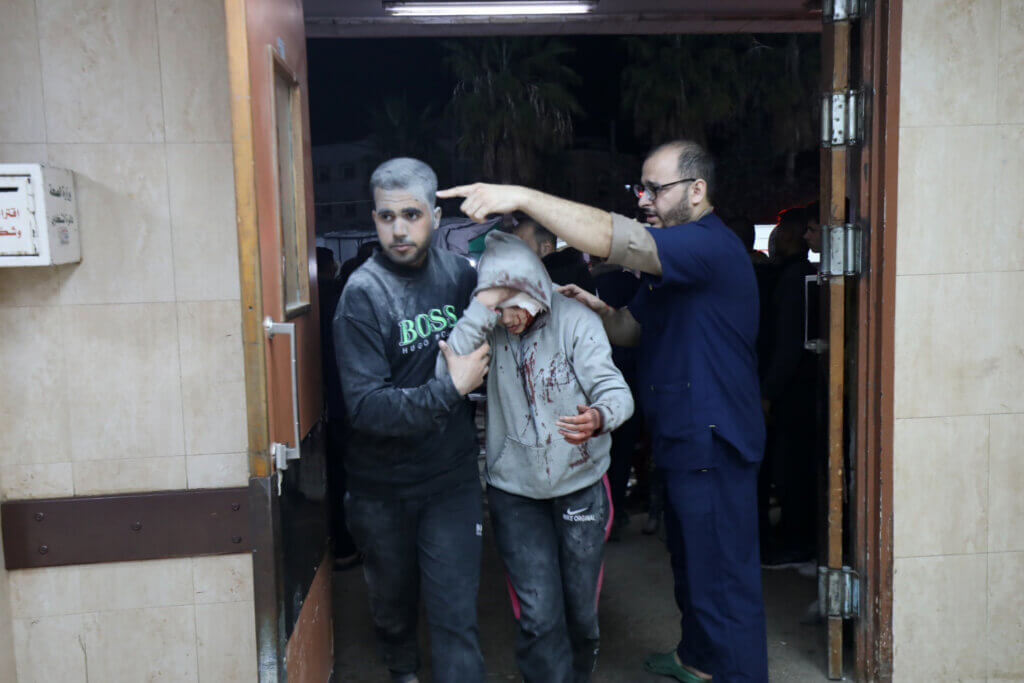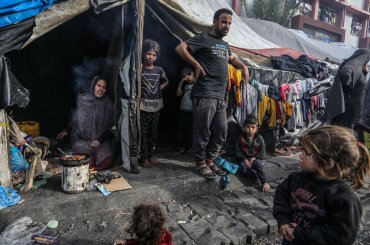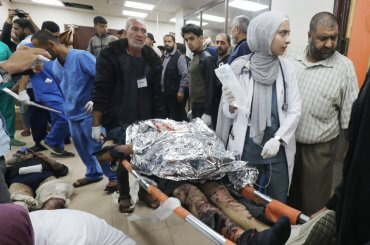Casualties
- 29,954+ killed* and at least 70,352 wounded in the Gaza Strip.
- 380+ Palestinians killed in the occupied West Bank and East Jerusalem
- Israel revises its estimated October 7 death toll down from 1,400 to 1,147.
- 582 Israeli soldiers killed since October 7, and at least 3,221 injured.**
*This figure was confirmed by Gaza’s Ministry of Health on Telegram channel. Some rights groups put the death toll number closer to 35,000 when accounting for those presumed dead.
** This figure is released by the Israeli military, showing the soldiers whose names “were allowed to be published.”
Key Developments
- Hamas armed wing launches volley of missiles from southern Lebanon at northern Israeli targets on Wednesday morning.
- Hamas says it bombed “the headquarters of Israel’s 769th Eastern Brigade, and its airport barracks in Beit Hilal in northern occupied Palestine (present day Israel), with two missile salvos consisting of 40 Grad missiles.”
- Hamas attack causes severe damage to Israeli buildings in Kiryat Shmona settlement in the Galilee panhandle area, close to the borders with Lebanon.
- Ismail Haniyeh says “any flexibility we show in negotiations, out of concern for the blood of our people, is matched by a willingness to defend them.”
- On ceasefire talks, senior Hamas figure, Basem Naim, says: “The gap is still wide. We have to discuss a lot of points with the mediators.”
- Russia calls U.N. Security Council members to refrain from endorsing U.S. proposed resolution on Gaza, saying it constitutes “another license to kill” for Israel.
- Carl Skau, deputy executive director of WFP, says there is “a real prospect of famine by May [in Gaza].”
- Al-Awda Hospital in northern Gaza cancels all orthopedic and plastic surgeries after Israeli bombing destroyed two operating rooms.
- The Commission for Prisoners warns that the life of Palestinian prisoner Moatasem Raddad, 38, is at risk inside Israeli jail.
- Israeli settlers block Palestinian cars from traveling on road connecting Asira Al-Qibliya and Urif villages, south of Nablus.
Hamas fires volley of missiles on Israel from Lebanon
Hamas’ armed wing, Izz El-Din Al-Qassam Brigades, launched on Wednesday morning a barrage of missiles from southern Lebanon on Israeli targets in the north.
Al-Qssam Brigades said it bombed “the headquarters of Israel’s 769th Eastern Brigade (Camp Ghaibour), and its airport barracks in Beit Hilal in northern occupied Palestine, with two missile salvos consisting of 40 Grad missiles.”
It said the attack comes as a response to “the Zionist massacres against civilians in the Gaza Strip and the assassination of the martyred leaders and their brothers in the southern suburbs of Lebanon,” referring to Saleh Al-Arouri, Hamas deputy political leader and four Al-Qassam’s commanders assassinated by Israel in January.
Israeli forces and Lebanon’s Hezbollah movement have been engaged in battles since October 8th, exchanging fire and tit-for-tat rocket attacks and air raids along the UN Blue Line that separates their territories.
Al-Qassam Brigades had launched several rockets on Israeli settlements from the Lebanese territory following the October 7th attacks. However, Wednesday’s missile attack is the biggest since December, causing severe damage in an Israeli building in Kiryat Shmona settlement in the Galilee panhandle area, close to the borders with Lebanon.
Israeli forces bombed several areas in southern Lebanon on Wednesday, launching an air raid on Bint Jbeil town, where plumes of smoke rose above Al-Maslakh neighborhood. No casualties have been reported on Wednesday morning.
Israeli officials have been threatening for months to launch a military operation inside Lebanon as Hezbollah’s attacks remained steady on Israeli northern settlements and military barracks. Analysts agree that such an act will ignite a regional war.
On Tuesday, Hezbollah carried out eight military attacks on Israeli targets.
Ismail Haniyeh warns Israel and U.S. of ‘political machinations’
On Wednesday, Hamas political leader Ismail Haniyeh said Israel and the U.S. will not be able to achieve with political machinations what it failed to get military on the ground in Gaza.
Haniyeh is the most senior figure to comment since a detailed potential ceasefire deal between Israel and Hamas was widely reported in the past few weeks.
“Any flexibility we show in negotiations, out of concern for the blood of our people, is matched by a willingness to defend them,” Haniyeh said.
He added that “the Zionist occupier is committing the most horrific crimes known to humanity in terms of murder, extermination and displacement in Gaza…”
“We assure the Zionists and the United States that what they were unable to impose on the field [militarily], they will not get through political machinations,” he added.
Haniyeh said Ramadan was “the month of Jihad,” calling Palestinians in the occupied West Bank and inside Israel to travel to Al-Aqsa Mosque in Jerusalem beginning on March 10. Israel recently announced that it would be imposing heavy restrictions on Palestinian access to the Al-Aqsa Mosque during the month of Ramdan, threatening to further inflame tensions in Jerusalem and the West Bank.
Haniyeh added that “the world, especially the Arab countries, must confront this [Israeli] enemy and restrain it to prevent it from invading Rafah. Everyone must take the initiative to break the starvation policy in Gaza,” he added, referring to the little humanitarian aid and food that has entered the Gaza Strip since January.
On Wednesday, Israel claimed that it allowed the entry of 31 aid trucks to northern Gaza, and 50 trucks in the past three days. Before October 7, at least 500 aid trucks entered the Gaza Strip to help hospitals, schools and centers cope with the Israeli blockade.
Haniyeh’s remarks about ceasefire talks reflect Hamas’s previously stated comment that the U.S. administration and its Western allies’ optimism to achieve it was far from the truth.
“The gap is still wide. We have to discuss a lot of points with the mediators,” Basem Naim, Hamas’s head of political and international relations, said on Wednesday.
Russian and American spat over Gaza resolution in UN
On Tuesday, the UN Security Council held a meeting to discuss a U.S. draft, which erupted in a spat between the Russian envoy Vassily Nebenzia and the U.S. and Western European representatives.
“Washington bears full responsibility for the unprecedented number of civilian victims of this escalation. Their number is now near 30,000. And that is the cost of the American veto in the Security Council on Gaza,” Nebenzia said.
The U.S. vetoed four resolutions that called for a ceasefire in the Gaza Strip and also the prevention of famine and mass starvation.
However, the U.S. deputy ambassador Robert Wood hit back at Nebenzia, accusing Moscow of forcing Ukrainians under to live “savage, barbaric bombings and killings that they have to deal with every single day”.
“I would just remind everyone in this room that the Russian Federation is a country that doesn’t contribute to resolving humanitarian crises. It creates them,” Wood said.
Nebenzia called UNSC members to refrain from endorsing the U.S. proposed resolution on Gaza, saying it constitutes “another license to kill” for Israel.
“This is not an alternative. This is yet another license to kill, which the United States wants to give to Israel, but this time to have a Security Council signature on it. I call on members of the council not to support this destructive initiative,” the Russian envoy to the UN said.
Palestinians in Gaza are ‘just a step away from famine’
Qatar’s Ministry of Foreign Affairs said on Wednesday, during a weekly media briefing, that the international community is not doing enough to prevent Israel from deliberately starving Palestinians in Gaza.
“So far, we have not seen any real pressure from the international community to allow full and unconditional entry of aid [into Gaza],” said Majed al-Ansari, the ministry’s spokesperson.
He added that 2.5 million Palestinians are “living in complete absence of health and emergency services,” more than one million in Rafah town in southern Gaza.
UN humanitarian officials briefed the Security Council on the food security in Gaza on Tuesday. Carl Skau, the deputy executive director of World Food Programme (WFP) said there is “a real prospect of famine by May [in Gaza].”
“Gaza is seeing the worst level of child malnutrition anywhere in the world,” Skau said, with “one child in every six under the age of two is acutely malnourished.”
For thousands of Palestinians in the Gaza Strip, “famine is just a step away,” the UN warned.
Al-Awda Hospital cancels all surgical operations
In the past 24 hours, Israeli forces committed eight “massacres” in various areas of the Gaza Strip, according to the Gaza Ministry of Health on Telegram, killing at least 76 Palestinian martyrs and injuring 110 people.
Since October, Israel has killed 29,954 Palestinians and injured 70,325 others. Thousands of civilians remain under the rubble.
Wafa news agency reported that an Israeli bombing of Gaza City killed six people and injured 22 others overnight.
They were waiting for aid trucks to arrive at Harun al-Rashid coastal road, west of Gaza City, when bombs’ shrapnel fatally injured them. They later died in Al-Shifa Hospital in Gaza City.
Israeli forces also bombed Al-Zaytoun, Al-Sabra and Al-Rimal Al-Janoubi neighborhoods in Gaza City. It also bombed the eastern parts of Khan Yunis and the southern Rafah town with artillery shells, close to shelter points.
Palestine Red Crescent Society (PRCS) said it rescued 34 Palestinians, following an Israeli bombing of two houses in Deir Al-Balah in central Gaza. PRCS released footage of crews with torches searching for survivors amid concrete debris and shattered and cracked walls.
Both the Nasser Hospital and Al-Amal Hospital are still coping with horrific conditions under Israeli siege, without electricity, enough food, or drinking water.
In north Gaza, medical staff at the Al-Awda Hospital had to cancel all orthopedic and plastic surgeries after the Israeli bombing destroyed two operating rooms.
Al-Awda’s director, Muhammad Salha, told Al-Jazeera that this meant “all medical services related to obstetrics and gynecology have stopped completely.”
“We were the only hospital in northern Gaza for orthopedic surgeries … There is no other alternative place in northern Gaza or Gaza City because the health ministry’s hospitals are out of service completely,” he said.
Palestinian prisoner’s life at risk inside Israeli jail
The Commission for Prisoners’ and Ex-Detainees’ Affairs warned that the life of Moatasem Raddad, 38, is at risk inside an Israeli jail. Raddad is from Sidon town in Tulkarm, and his health has deteriorated in Ofer military prison near Ramallah.
He was arrested in 2006 and sentenced to 20 years in jail. The Commission said that Raddad suffered intestinal bleeding and severe pain.
“The treatment he receives in prison is inappropriate, and the food provided to him is extremely poor, in terms of quality and quantity,” it added.
Last week, Khaled Al-Shawish, 53, from Al-Fara’a refugee camp north of Tubas, died inside an Israeli jail.
Shawish has been detained since 2007, and has been sentenced to 11 life sentences. He is the ninth Palestinian prisoner to die while in Israeli detention since October and the 246 prisoners since June 1967.
Since October, Israeli forces have arrested at least 7,305 Palestinians in the occupied West Bank and Jerusalem, the Commission added; 20 of them in the past 24 hours, rounded up during night raids of several towns and cities.
Palestinian, Israeli, and international human rights groups have decried the deplorable conditions in Israeli prisons and detention centers, where Palestinian detainees have been tortured, abused, and subjected to sexual violence.
Israeli forces destroy two houses near Bethlehem
Israeli settlers blocked Palestinian cars from traveling on a road connecting Asira Al-Qibliya and Urif villages, south of Nablus, Wafa reported. Settlers arrived from the illegal outpost of Yitzhar and set up a makeshift checkpoint on the road, firing live bullets and forcing Palestinians to make a detour to reach their destinations.
In Al-Walaja, near Bethlehem, Israeli forces destroyed a house and a mobile home in the town. Israeli forces also stormed Jenin and its refugee camp overnight.
On Tuesday evening, hundreds of Palestinians took part in the funeral of Nizar Mahmoud Abdel Muti Hassasna, 34, from Al-Ubaidiya town. Israeli forces shot Hassana near Mazmoria military checkpoint which cuts Jerusalem from Bethlehem.



I wonder how the average Lebanese feel about yet another Iranian proxy using their land as a launch pad for attacks in Israel. Its pretty obvious that Hamas does not give a damn about the welfare of their own people, so its unlikely they have concern for Lebanon.